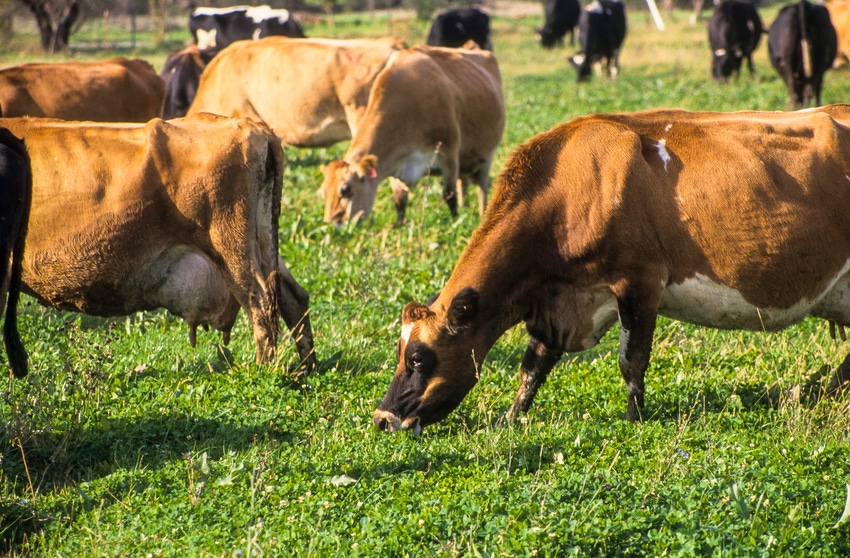Rule prohibits continuous transitions and cycling of dairy animals into and out of organic production.

The Organic Trade Assn. (OTA) and the National Farmers Union (NFU) urged the U.S. Department of Agriculture to finalize a proposed rule that would allow organic dairy farms to transition conventional replacement animals into organic production only once, prohibiting the continuous transition that some farms have practiced.
Currently, USDA policy allows a one-time transition of dairy cows from conventional to organic production but has been inconsistently enforced, “putting farmers who play by the rules at a competitive disadvantage and undermining the integrity of the organic label. However, a proposed rule would level the playing field by more clearly defining current regulations,” NFU said in a release.
In its official comments submitted during the public comment period ending Dec. 2, OTA said it continues to support the Origin of Livestock proposed rule and “urges USDA to move expeditiously to a final rule to clarify and narrow the allowance to transition dairy animals into organic milk production as a one-time event.”
The proposed Origin of Livestock Rule specifies that organic dairy animals must be raised organically from the last third of gestation or be raised organically for one year if transitioning a conventional herd to organic and further clarifies that this transition is allowed only once. It specifies that once a distinct herd is transitioned to organic, all animals must be raised organically from the last third of gestation or sourced from another dairy farm that has completed its one-time transition. The rule effectively prohibits continuous transitions and cycling of dairy animals into and out of organic production.
OTA said it was submitting additional comments to those it submitted in 2015 to “reflect new information regarding the continued need for consistent enforcement of organic dairy standards. Conditions that prompted rule-making on origin of livestock have not changed. New information since 2015 only reaffirms the need for rule-making to clarify and strengthen regulations on origin of livestock.”
The National Organic Program reopened the public comment period on Oct. 1, 2019, for the Origin of Livestock proposed rule that originally was published in 2015.
More than 600 new comments were submitted during the latest comment period, nearly all in support of the rule. The latest comments from organic stakeholders reinforced the more than 1,500 comments already submitted during the 2015 comment period favoring implementation of the final rule.
“The organic industry has been asking for this critical clarification since 2010. There should be no doubt that the industry has reached consensus on this policy,” OTA chief executive officer and executive director Laura Batcha said.
In a clear demonstration of the unified position of the organic sector, OTA’s Dairy Council also submitted a letter in support of the rule. Dairy Council membership represents more than 90% of the U.S. organic dairy market and includes a diverse cross-section of farmers and companies. The council stated, “A final rule on origin of livestock is needed now more than ever. … With the downward pressure on dairy prices and slowdown in organic dairy consumption and sales, the importance of fair enforcement of regulatory standards is paramount.”
NFU president Roger Johnson said the organic label is only as meaningful as the enforcement of organic standards, and currently, the origin of livestock provisions are being applied inconsistently across the industry, allowing some farmers to repeatedly transition conventional replacement animals into organic production while others comply with the rules and only transition a single, distinct herd once.
“This practice not only confuses American consumers, who have certain expectations about what the organic label means, but also puts rule-abiding producers at a significant disadvantage and threatens the integrity of the organic program,” Johnson said. “By providing greater clarity on transition regulations and ensuring that standards are uniformly applied, the Origin of Livestock proposed rule would protect consumer confidence in the organic label and ensure its economic viability for family farmers. We urge USDA to act quickly to finalize and implement this crucial rule.”
In addition, Congress has shown strong, bipartisan support for the rule, and the five co-chairs of the House Organic Caucus -- Reps. Rodney Davis (R., Ill.), Peter DeFazio (D., Ore.), Ron Kind (D., Wis.), Dan Newhouse (R., Wash.) and Chellie Pingree (D., Maine) -- submitted a letter to Agriculture Secretary Sonny Perdue in the public comments. The lawmakers said the issue is “critical for thousands of organic dairy farmers around the country,” and they strongly urged USDA to implement the final rule immediately, noting that “U.S. dairy farmers have experienced extreme hardship over the last few years as milk prices have plummeted due to a variety of market factors. … The lack of enforcement on the Origin of Livestock standards is one of many factors that is disrupting the marketplace for organic dairy farmers.”
The members of Congress cited OTA data showing that organic dairy farmers who raise their calves according to the organic standard from birth spend an average of $600-1,000 more per calf than farmers who raise calves conventionally and transition them to organic at one year of age.
“This cost differential is one of the many reasons why transition was meant to be limited as a one-time event,” the lawmakers stated.
By the close of the comment period, wide support for the rule had been voiced by stakeholders, including organic dairy farmers, processors and retailers, advocacy groups and consumers.
About the Author(s)
You May Also Like




.png?width=300&auto=webp&quality=80&disable=upscale)
